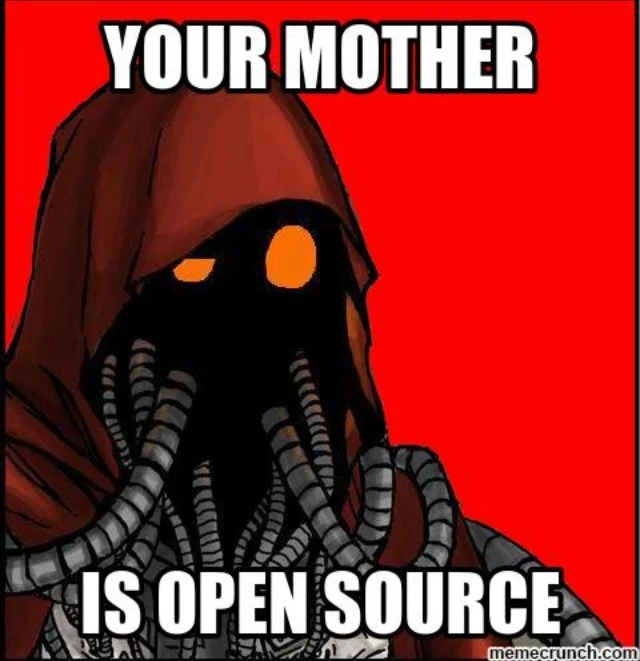Nextcloud asked in a poll at https://mastodon.social/@nextcloud@mastodon.xyz/115095096413238457 what database its users are running. Interestingly one fifth replied they don’t know. Should people know better where their data is stored, or is it a good thing everything is running so smoothly people don’t need to know what their software stack is built upon?
If you’re running it in a prebuilt container, as long as it works it shouldn’t matter and you don’t need to care.
Of course, when your database gets corrupted after Nextcloud updates because you had an app running that isn’t supported in the new version, it will suddenly matter a lot.
I‘m using a hosted Nextcloud instance from Hetzner and I have no idea what this is running on either. There’s a significant number of people who didn’t set up their Nextcloud instance, so people not knowing what it’s running on isn’t too surprising.
Will Nextcloud run apps not marked as compatible with that version?
No.
You can specify the behavior in a few places, gui, occ command, config.php. By default no, but if you have an app you want to force in regardless of the version compatibility you can make it so https://help.nextcloud.com/t/help-what-is-app-install-overwrite-for/71523
Bugs still happen. Just did with the most recent version and the polls app and mysql
And if you don’t know what database you’re running, how are you backing it up?
If you don’t know what database you’re running, are you bothering to do a full shutdown before backups? Are you doing backups at all…
Exactly. It’s not important … until it is. :D
If you’re using the AIO image, backup/restore can handled for you, so no need to worry about the manual steps involved. Or if you’re using a VM, a backup can take the form of full system snapshots, so also no need to understand how data are stored. Granted it’s always helpful to know what your running, but not necessarily requisite, even for backups.
The poll did not ask specifically for self-hosted instances. You know you can buy hosted Nextclouds where the service provider hopefully cares for that stuff? So customers wouldn’t know which database they use. I don’t know which database my mail provider uses ¯\_(ツ)_/¯
Fair enough, I did assume the target audience was selfhosters based on the question.
As for provider backups - well, you’d hope. But M$ doesn’t do user available backups, so I’d be surprised if that was bundled by the average SaaS provider.
I write software for a living, and have worked with all 3 database options in the past. I don’t know what DB backend my nextcloud server is using, nor do I care.
Yeah, that is the kind of concern for the service developer or a very opinionated sys admin. For self-hosting, few people will reach the workload where such a decision has any material or measurable impact.
Exactly. Unless you are actively doing maintenance, there is no need to remember what DB you are using. It took me 3 minutes just to remember my nextcloud setup since it’s fully automated.
It’s the whole point of using tiered services. You look at stuff at the layer you are on. Do you also worry about your wifi link-level retransmissions when you are running curl?
Sorry for the newbie question, but how is your nextcloud setup automated? Is that like a compose/yaml file?
stares at 300 line shell script+ansible mess that updates/sets up Forgejo, Nextcloud, ghostcms
“Yes… It’s automated”
Self hosting doesn’t mean “being wasteful and letting containers duplicate services”. I want to know which DB application X is using, so I pool it for applications Y and Z.
For most applications the overhead of running a second DB server is negligible.
And if it’s SQLite (which I believe is the default) it’s really just reading and writing a file on the file system.
I disagree. You are just entertaining the idea that servers must always and forever be oversized, that’s the definition of wasteful (and environmentally irresponsible). Unless you are firing-up and throwing-away services constantly, nothing justifies this and sparing the relatively low effort it is to deploy your infrastructure knowingly.
Do you have the data to back that up? Have you measured how much of an impact on system load and power consumption having 2 separate DB processes has?
Roughly the same amount of work is being done by the CPU if you split your DBs between 2 servers or just use one. There might be a slight increase in memory usage, but that would only matter in a few niche applications and wouldn’t affect environmental impact.
Do you have the data to back that up?
I mean, you are the one making the exceptional claim that unnecessarily running multiple instances of programs on a device with finite resources has no practical adverse effect. Of course, the effects can be more or less drastic depending on the many variables at play (hardware, software, memory pressure, thread starvation, cache misses, …) and can indeed be negligible in some lucky circumstances. The point is that you don’t call that shot, and especially not by burying your head in the sand and pretending it’s never gonna be a problem.
Effective use of computing resources requires tuning. Introduction of a new service creates imbalance. Ensuring that the server performs nominally and predictably for all intended services is a balancing act and a sysadmin’s job. Services whose deployment settings are set by someone with no prior knowledge of the deployment constraints can’t be trusted to do a good job at it (that’s the nature of the physical world we live in, not my opinion), and promoting this attitude promote the kind of wasteful and irresponsible computing I was on about.
Now, I’ll give you the link to this basic helper for tuning a PostgreSQL server: https://pgtune.leopard.in.ua/
Will you tell me what are the correct inputs for my homelab (I won’t tell you the hardware, the set-up, the other services running on it, the state of the system, etc)?
And later, when you will distribute your successful container to millions of users, what will you respond to the angry ones that will complain that your software is slow, to no fault of your coding, because they happen to pile up multiple DBs, web servers, application servers, reverse proxies, … on their banana SoCs?I’m saying this based on real world experience: after a certain point you start to see deminishing returns when optimizing a system, and you’re better off focusing your efforts elsewhere. For most applications, customizing containerized services to share databases is far past that point.
This is one of my pet peeves with containerized services, like why would I want to run three or four instances of mariadb? I get it, from the perspective of the packagers, who want a ‘just works’ solution to distribute, but if I’m trying to run simple services on a 4 GB RPi or a 2 GB VPS, then replicating dbs makes a difference. It took a while, but I did, eventually, get those dockers configured to use a single db backend, but I feel like that completely negated the ‘easy to set up and maintain’ rationale for containers.
Precisely what pre-devops sysadmins were saying when containers were becoming trendy. You are just pushing the complexity elsewhere, and creating novel classes of problems for yourself (keeping your BoM in control and minimal is one of many others that got thrown away)
“18% of car owners don’t know their brake fluid DOT rating.”
That is actually good news. Means that people more likely to be “normies” are adopting an alternative solution.
I can confirm I’m a newer user (not a normie) to Nextcloud and I don’t know or really care what it uses because it works so I haven’t had to learn what it is or how to debug it.
Every person using a computer should know what their filesystem is and what database they are using. Otherwise they are fools.
Can you believe kids don’t know what NTFS or APFS are these days?! Stupid iPad babies.
Haha at some point it did matter to regular folks though. I remember in Junior high when I would try to pirate games or software on Windows, I learned the big difference between fat32 and the new filesystem Microsoft released, NTFS because I couldn’t download files larger than 4GB on fat32.
It’s important if you’re using flash drives across platforms though that’s pretty rare these days too. My wife has run into this problem by formatting as ExFAT (GUID partition table) when print shops’ terrible machines only support FAT32 and/or MBR partition tables.
Thankfully macOS at home understands ExFAT otherwise those formatted drives from her Windows work computer wouldn’t even work.
At that point, were you regular folks though?
True, I guess not. But piracy was big at that age group because we were kids who didn’t have our own money, so if our parents didn’t buy the games we wanted, people would try to download them instead. So I fell into learning this detail by necesssity instead of out of pure curiosity or desire to learn more about the computer. I wanted to download Neverwinter Nights or whatever game, and fat32 was standing in my way, haha
FAT32 is still a very common filesystem for flash drives and memory cards because it works on everything. Lots of people are likely to run into the 4GB file size limit.
I remember having to open “.zip.1” files lol. From the split zips.
I still have a FAT32 external drive that this (very) rarely still bites me 😫 there’s nothing important on it, so I’ve been lazy

Wait is APFS a new file system than NTFS? Guess I’m too busy on my Tiktoks and Nintendos to keep up to date
Damn kids with your twitternets and me mes.
Apple file system
Ah that would explain why I didn’t know. I have next to no experience with Apple devices.
Ewww…
Look into it, it’s pretty good.
And Apple updated hundreds of millions of devices to it from an old file system without losing any data. Imagine Microsoft pulling off such a migration. It was silently done in the background with a normal OS update. Really impressive.
No, it’s garbage because of its approach to case sensitivity.
It’s case insensitive by default (which is a WTF in itself and encourages the same laziness Windows users thrive on with NTFS) but it also has a case sensitive mode.
Except the case sensitive mode is almost entirely useless because of the amount of apps it breaks that assume the default case-insensitive mode. It also means that you as a programmer have to add extra crap to your file handling code for case insensitive string comparisons if you want to support both modes
Armor piercing fin stabilized.
It’s used on popular toys and consumer gadgets. Most well to do tech nerds don’t bother with such riff raff either.
Holy Poe’s Law…
Kids don’t event know the folder struture of their Home directory, so why would they know what a File System is? Lol
Sir, this is a Wendy’s :)

That kid is never going to figure out if they downloaded the assignment pdf to “Downloads (iPad)” or “Downloads (iCloud)”
Whatever the docker compose file that I found had
I also have no idea if my place has PVC or galvanized steel plumbing; or its designed electrical load. Why should users care about the DBMS.
I found this way funnier then I think you meant it… PVC wasn’t persistent volume claim was it?
Unless he installed kubernetes pipes, no.
If you need to fix something, you should know what it is.
I’ll get that info as soon as something breaks, I guess.
The rule of internet polls is that the funniest answer is always over-represented.
I have five users, max, and barely any files. I don’t know which one Nextcloud AIO uses and I don’t care. There’s no wrong answer for such a small deployment. It uses whatever database Nextcloud felt was sensible as the default. They know more about picking the right tool for their requirements than I do.
If I’m building something for myself, then I care.
Isn’t that the whole point of containerised solutions? Having some pre-setup, auto-updating solution with very little requirement to dive into the details like what your database is and which dependencies you need to manage…
You still need to know what database system is being used in order to make backups of the database. You can’t just snapshot or backup the data directory while a database is running, because you might end up with an inconsistent state that won’t restore properly. You need to either stop the DB before doing the backup, or use the relevant DB-specific tools to perform a backup.
Most of my containerized solutions do that for me.
Which containers do automatic DB backups? Normally the database is a separate container, unless the app is using SQLite. Is there a MySQL or PostgreSQL container that does automated backups?
So one in five doesn’t do proper backups. That’s much better than expected… 😅
I’d say 9/10 aren’t doing proper backups given most people don’t actually do DR runs and verify whether they can fully recover from their backups. If you don’t test your backups, you don’t have backups!
90% is a bit low if the requirement is a full backup of nextcloud with database that is easily restorable.
If they do backups, most just copy the important stuff manually to an external hard drive.
*18% of the people who answered a poll on Mastodon
It’s funny that the headline frames it as “a big number” when in reality majority of users don’t know what database they’re using and probably don’t even know what a database is. Such polls aren’t useless but you always get skewed results towards the more technical population. They would have to create a poll inside the nextcloud webapp to get more balanced results.
Theres heaps of hosted nextcloud services. Those users wouldn’t know.
Honestly, does it matter to a regular user?
There will be some that do matter, if I were to run NC I would use Lite because why throw the data to another process just to write it to a disk when I only have a single node.Well it does depend on your exact use case, but using a proper database is usually the better option for production. Now if this is just some little service you made for yourself use whatever you want.
SQLite is a proper database. Realistically you’ll never exhaust its 278tb storage limits, it’s thoroughly battle tested, and it’s dead easy to backup.
I doubt nextcloud is running enough parallel db writes for this to actually matter — and if it is WAL mode is still probably good enough.
Once you have multiple software clients running then you will need a client server dbms like Postgres. For most home or group installations, this should not be an issue.
Even if you have multiple clients (most have a phone + laptop) WAL would be able to handle that easily, have you seen the benchmarks?
Nextcloud is pushed as an easy to use docker setup these days, heck most people I know who “use” it don’t do much with it at all so what database it is using is gonna be way back in their list of priorities…
Plus the users outweigh the admins surely (as in those that just install then forget)Where’s the option for “what’s a database?”
Agree - I’m sharing files, not databases…
I’m not even sharing files, I’m sharing mp3’s and some zips. Duh.





















